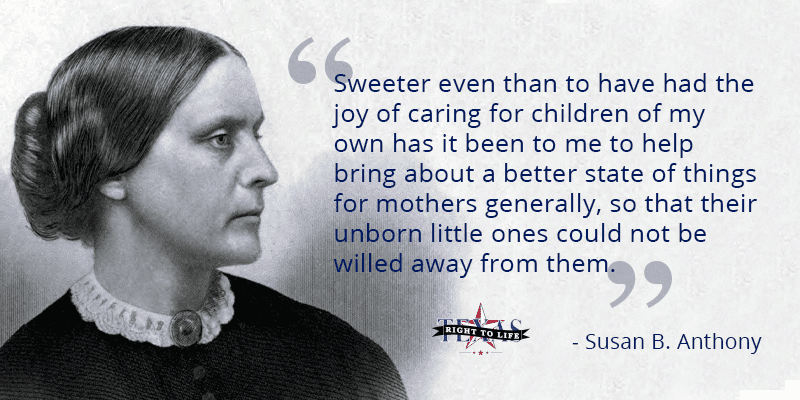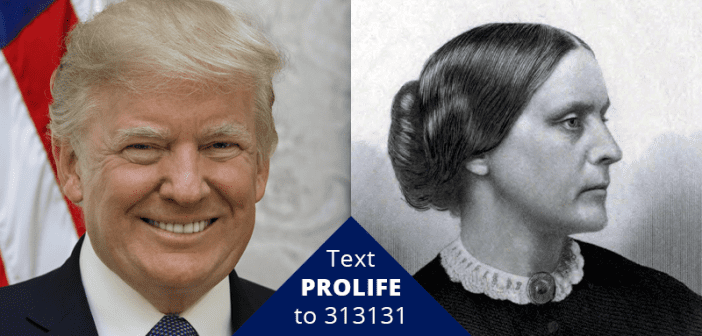President Donald Trump granted a posthumous pardon to Susan B. Anthony on August 18. The day marked the 100th anniversary of the ratification of the 19th Amendment, which gave women the right to vote. Anthony was one of the most prominent leaders of the women’s suffrage movement, who, like many leading suffragettes, was uncompromisingly Pro-Life.
The pardon applies to what President Trump called the “unjust” arrest and conviction of Anthony for voting in an 1872 election, the only vote she ever cast. A press release from the White House states, “Susan B. Anthony is an American icon who has inspired millions of women across the Nation through her advocacy and accomplishments, and the generations of Americans who have devoted themselves to the work of perfecting our union are forever indebted to her example and legacy.”
The press release continues, “The decision to posthumously pardon Susan B. Anthony removes a conviction for exercising a fundamental American right and one that we as citizens will lawfully employ this November.” The pardon of such a towering figure of the women’s suffrage movement on the 100th anniversary of women securing the right to vote would not seem to be a partisan move. There is nothing about having a strongly Pro-Life president in office that makes a presidential pardon possible. Until now, politicians on both sides of the aisle recognized Anthony as a remarkable American. As President Trump noted when making the announcement, “She was never pardoned. Did you know that? She was never pardoned. What took so long?”
Yet, anti-Life pundits were quick to condemn even Anthony because of Trump’s recognition. Instead of celebrating the day as a remarkable moment for women in America, anti-Life news outlets, like the New York Times, tried to “cancel” Susan B. Anthony. The notoriously anti-Life publication described Anthony as an “increasingly divisive figure” who is seen as a hero of “anti-abortion forces” and has been “criticized for relegating black suffragettes to the sidelines.” This line of attack demonstrates the predictability of “cancel culture.” If even a renowned activist who devoted her life to securing the right to vote for women is praised by a Pro-Life president, then she is, according to cancel culture, a racist.

Citing unnamed “people close to the president,” the New York Times tried to cast doubt on the sincerity of Trump’s pardon. The article states, “Advisers believed that unlike some of Mr. Trump’s other pardons or grants of clemency, it will be harder to criticize one benefiting a woman whose actions helped lead to women’s right to vote.” Clearly that was not the motivation. As the article in which this statement appears demonstrates, anti-Lifers will go after even Anthony if they think abortion could rightly be called into question.
Other critics tried to ignore Anthony’s Pro-Life views and claimed that her heroic status requires rescinding the presidential pardon. For example, New York’s Lieutenant Governor Kathy Hochul tweeted, “As highest ranking woman elected official in New York and on behalf of Susan B. Anthony’s legacy we demand Trump rescind his pardon.” She added, “She was proud of her arrest to draw attention to the cause for women’s rights, and never paid her fine.” Other media outlets have also claimed that the pardon is “undermining Anthony’s wishes.”
What gives Hochul and a select group of historians the right to speak “on behalf of Susan B. Anthony’s legacy” is not clear. What is clear is that Anthony’s legacy is a Pro-Life legacy. Like many of the early feminists and suffragettes, Anthony condemned abortion. She noted that abortion is used as a tool by men to oppress women and that the killing of a preborn child is an indication that society has failed the mother.
Trump’s pardon of one of our nation’s greatest suffragettes calls attention to the rights and responsibilities we have in the upcoming election. As cancel culture descends on some of the greatest Americans, Pro-Lifers must ensure strong Pro-Life champions are elected to office this fall.


